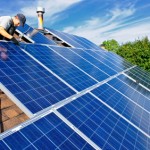A report by the Department of Energy and Climate Change (DECC) has revealed that solar PV installations dropped by nearly 90 per cent since the British Government halved Feed-In Tariffs (FITs) in April.
 The seemingly rapid decline had been expected by the solar industry, which criticised government officials for failing to realise the potential of one of the few areas of growth in the British economy. Prime Minister David Cameron, meanwhile, argued that FITs were no longer affordable and that reduced manufacturing costs of solar panels ought to balance out the subsidy cuts.
The seemingly rapid decline had been expected by the solar industry, which criticised government officials for failing to realise the potential of one of the few areas of growth in the British economy. Prime Minister David Cameron, meanwhile, argued that FITs were no longer affordable and that reduced manufacturing costs of solar panels ought to balance out the subsidy cuts.
The government had hoped to introduce the cuts in December last year, but a legal battle in the High Court ruled that no such change would be lawful until April 2012. After introducing the first round of cuts last month, further reductions are expected to be made by the government in the years ahead. If the number of solar panel installations has already fallen by almost 90 per cent, would the industry even survive the next few years?
Explaining the cuts, Minister of State for Energy and Climate Change Greg Barker said: “The whole point of my reforms is to bring in a much greater degree of certainty and predictability”.
Mr Barker added that he expects Britain to achieve its target of 22GW of installed solar PV capacity by 2020 despite the fact that only 18MW of capacity was installed in 2011 during the ‘solar boom’. Since solar subsidies were cut from 43p/kWh to 21p/kWh in April, weekly installations have fallen 87 per cent on average compared with the previous year.
Shadow Energy and Climate Change Secretary Caroline Flint made clear Labour’s position on the matter by stating: “For months Labour has been warning that the government’s cuts to solar power would destroy thousands of jobs, cut off a green hi-tech British industry and stop families controlling soaring energy bills”.
Ms Flint added that, at the current rate of installation, Britain would not achieve solar capacity of 22GW for another 169 years.
Solar panels can help households control energy bills by providing them with a renewable source of energy. Although subsidies no longer offer the same incentives, solar panels can provide a reasonable return on investment over a 20 year period.


